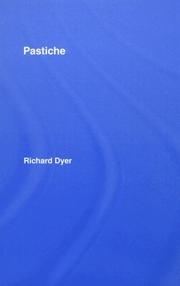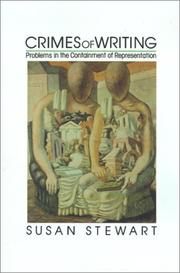| Listing 1 - 10 of 33 | << page >> |
Sort by
|

ISBN: 0415340098 0415340101 Year: 2007 Publisher: New York : Routledge,
Abstract | Keywords | Export | Availability | Bookmark
 Loading...
Loading...Choose an application
- Reference Manager
- EndNote
- RefWorks (Direct export to RefWorks)
Writing with his customary wit and style, Dyer argues that while pastiche can be used to describe works which contain montage or collage, it can also be used to describe works which are a kind of imitation of previous works. Because of its self-consciousness, pastiche is often seen as emotionally distancing; Dyer argues that it can in fact be extremely moving--thus self-awareness and emotion can co-exist. To illustrate his thesis, Dyer investigates a wide range of cultural texts drawn from films, videos, novels, poetry, rap tracks, music and painting. He explores issues of text, genre, and the use of pastiche as a resource within a work. The last chapter draws together the underlying concern of the book with affect and poetics and discusses the politics of pastiche.
Audio
Year: 1972 Publisher: [S.l.] : EMI,
Abstract | Keywords | Export | Availability | Bookmark
 Loading...
Loading...Choose an application
- Reference Manager
- EndNote
- RefWorks (Direct export to RefWorks)
Pasticcio’s --- Operettes --- Oostenrijk --- 19e eeuw
Book
Year: 1765 Publisher: London : printed for and sold by Robert Bremner,
Abstract | Keywords | Export | Availability | Bookmark
 Loading...
Loading...Choose an application
- Reference Manager
- EndNote
- RefWorks (Direct export to RefWorks)
Pasticcio’s --- Opera's --- Engeland --- 18e eeuw
Book
ISBN: 9004289488 9004264728 1322984840 Year: 2015 Publisher: Leiden, Netherlands ; Boston, [Massachusetts] : Brill,
Abstract | Keywords | Export | Availability | Bookmark
 Loading...
Loading...Choose an application
- Reference Manager
- EndNote
- RefWorks (Direct export to RefWorks)
In Proba the Prophet: The Christian Virgilian Cento of Faltonia Betitia Proba Sigrid Schottenius Cullhed offers an in-depth study and reappraisal of the Cento of Proba and its reception. Proba's poem belongs to the few extant Latin texts from Antiquity penned by a woman writer, and one of the oldest Christian Latin poems. Schottenius Cullhed surveys and challenges common preconceptions and biographical constructions of the poem's author and early readers, and examines their impact on interpretations and evaluations of the text. The author also develops and puts to use an alternative model for understanding the poem and convincingly shows how the Virgilian source texts form a complex net of internal and external biblical typologies within the Cento .
Centos --- Cento verse --- Collage poems --- Mosaic poems --- Patchwork poems --- Patchwork poetry --- Poetry --- Pasticcio --- History and criticism. --- Proba, --- Bible --- In literature.
Book
ISBN: 3849816125 9783849816124 Year: 2020 Publisher: [S.l.] AISTHESIS VERLAG
Abstract | Keywords | Export | Availability | Bookmark
 Loading...
Loading...Choose an application
- Reference Manager
- EndNote
- RefWorks (Direct export to RefWorks)
Irony in art. --- Art, Modern --- Wit and humor in art. --- Pasticcio in art. --- Parody in art. --- Themes, motives.
Book
ISBN: 1139626418 1108063381 Year: 1803 Publisher: Place of publication not identified : Cambridge : publisher not identified, Cambridge University Press
Abstract | Keywords | Export | Availability | Bookmark
 Loading...
Loading...Choose an application
- Reference Manager
- EndNote
- RefWorks (Direct export to RefWorks)
Thomas Chatterton (1752-70) was only seventeen when he died of arsenic poisoning. Among his family and friends he was known as a versifier with a fascination for medieval manuscripts, but none suspected the true scope of his work. At eleven, he was already writing poetry, and by the end of his life his love poems, eclogues and forged medieval pieces numbered in the hundreds. They were to influence the Romantics for decades after his death. This three-volume collection of his work, edited by Joseph Cottle and Robert Southey, first appeared in 1803. Volume 2 contains the Rowley poems, for which Chatterton is best known. Ironically, they were never published under his own name in his lifetime: he claimed that the poems were transcripts he had taken from the work of Thomas Rowley, a fifteenth-century monk. The value of these ambitious forgeries is still underappreciated.
English poetry --- Literary forgeries and mystifications. --- Frauds, Literary --- Literary frauds --- Literary hoaxes --- Literary mystifications --- Mystifications, Literary --- Authorship --- Errors and blunders, Literary --- Forgery --- Hoaxes --- Literary curiosa --- Anonyms and pseudonyms --- Imaginary books and libraries --- Pasticcio
Book
ISBN: 1800643284 1800643276 1800643306 Year: 2022 Publisher: Cambridge : Open Book Publishers,
Abstract | Keywords | Export | Availability | Bookmark
 Loading...
Loading...Choose an application
- Reference Manager
- EndNote
- RefWorks (Direct export to RefWorks)
William Sharp (1855-1905) conducted one of the most audacious literary deceptions of his or any time. A Scottish poet, novelist, biographer, and editor, he began in 1893 to write critically and commercially successful books under the name Fiona Macleod who became far more than a pseudonym. Enlisting his sister to provide the Macleod handwriting, he used the voluminous Fiona correspondence to fashion a distinctive personality for a talented, but remote and publicity-shy woman. Sometimes she was his cousin and other times his lover, and whenever suspicions arose, he vehemently denied he was Fiona. For more than a decade he duped not only the general public but such literary luminaries as George Meredith, Thomas Hardy, Henry James, William Butler Yeats, and E. C. Stedman.
Authors, Scottish --- Authors, Scottish. --- Literary forgeries and mystifications. --- Frauds, Literary --- Literary frauds --- Literary hoaxes --- Literary mystifications --- Mystifications, Literary --- Authorship --- Errors and blunders, Literary --- Forgery --- Hoaxes --- Literary curiosa --- Anonyms and pseudonyms --- Imaginary books and libraries --- Pasticcio --- Scottish authors
Book
ISBN: 0813946263 081394628X 9780813946283 9780813946269 9780813946276 Year: 2021 Publisher: Charlottesville
Abstract | Keywords | Export | Availability | Bookmark
 Loading...
Loading...Choose an application
- Reference Manager
- EndNote
- RefWorks (Direct export to RefWorks)
"This book investigates fictional forgeries, from Thomas Chatterton's phony "medieval" poems written in the eighteenth century, to forged documents attributed to Shakespeare created in the nineteenth century, to Clifford Irving's fake autobiography of Howard Hughes in the twentieth century"--
Literary forgeries and mystifications. --- Forgery in literature. --- Frauds, Literary --- Literary frauds --- Literary hoaxes --- Literary mystifications --- Mystifications, Literary --- Authorship --- Errors and blunders, Literary --- Forgery --- Hoaxes --- Literary curiosa --- Anonyms and pseudonyms --- Imaginary books and libraries --- Pasticcio
Book
ISBN: 0748675558 9780748675555 9780748675562 0748675566 1474406343 9781474406345 Year: 2014 Publisher: Edinburgh Edinburgh University Press
Abstract | Keywords | Export | Availability | Bookmark
 Loading...
Loading...Choose an application
- Reference Manager
- EndNote
- RefWorks (Direct export to RefWorks)
Textual Deceptions considers a wide range of twentieth- and twenty-first century literary works in which the relationship between text and author is not what it seems. By exploring a variety of examples of false or embellished memoirs, purportedly autobiographical novels that are in fact thoroughly fictional, as well as bogus authorial personae, Sue Vice discusses whether it is possible to judge veracity by means of textual clues alone. The accounts featured range from 'misery memoirs' to Holocaust testimony, poetry purportedly by a Hiroshima survivor, short stories by an Albanian civil servant, fiction by an Aboriginal woman and by a former male prostitute.The book explores both why such texts arise, including consideration of writers' motives as well as pressures from the publishing industry, readers' tastes and contemporary social issues, and also how such texts are constructed, concluding with an assessment of their literary merit. Key Features: * Analyses the background, literary construction and value of a wide range of recent false memoirs and literary deceptions *Considers whether internal detail alone is sufficient to identify the truth-value or otherwise of a text, or if other evidence must be invoked *Explores the contradiction between contemporary literary critics' adherence to Roland Barthes's notion of the 'death of the author', and the apparently supreme importance of the role and biography of authors in the scandals that accompany revelations of deception
Literary forgeries and mystifications. --- Autobiography. --- Autobiographies --- Autobiography --- Egodocuments --- Memoirs --- Biography as a literary form --- Frauds, Literary --- Literary frauds --- Literary hoaxes --- Literary mystifications --- Mystifications, Literary --- Authorship --- Errors and blunders, Literary --- Forgery --- Hoaxes --- Literary curiosa --- Anonyms and pseudonyms --- Imaginary books and libraries --- Pasticcio --- History and criticism --- Technique

ISBN: 0195066170 1280533420 0195362098 9780195362091 9786610533428 6610533423 9780195066173 0197723608 9781280533426 Year: 1991 Publisher: New York Oxford University Press
Abstract | Keywords | Export | Availability | Bookmark
 Loading...
Loading...Choose an application
- Reference Manager
- EndNote
- RefWorks (Direct export to RefWorks)
From the origins of modern copyright in early eighteenth-century culture to the efforts to represent nature and death in postmodern fiction, this pioneering book explores a series of problems regarding the containment of representation. Stewart focuses on specific cases of ""crimes of writing""--the forgeries of George Psalmanazar, the production of ""fakelore,"" the ""ballad scandals"" of the eighteenth and nineteenth centuries, the imposture of Thomas Chatterton, and contemporary legislation regarding graffiti and pornography.
Law and literature. --- Literary forgeries and mystifications. --- Mimesis in literature. --- Ut pictura poesis (Aesthetics). --- Ut pictura poesis (Aesthetics) --- Literature and law --- Literature --- Aesthetics --- Art and literature --- Humanism in art --- Representation (Literature) --- Imitation in literature --- Realism in literature --- Frauds, Literary --- Literary frauds --- Literary hoaxes --- Literary mystifications --- Mystifications, Literary --- Authorship --- Errors and blunders, Literary --- Forgery --- Hoaxes --- Literary curiosa --- Anonyms and pseudonyms --- Imaginary books and libraries --- Pasticcio
| Listing 1 - 10 of 33 | << page >> |
Sort by
|

 Search
Search Feedback
Feedback About UniCat
About UniCat  Help
Help News
News